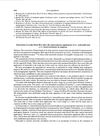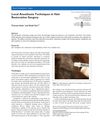 January 2024 in “Dermatologic Therapy”
January 2024 in “Dermatologic Therapy” PRP therapy with specific growth factors improves hair density and thickness in androgenic alopecia.
 January 2023 in “Dermatologìâ ta venerologìâ”
January 2023 in “Dermatologìâ ta venerologìâ” Biotin tablets and shampoo effectively stop hair loss and restore hair function in women.
 118 citations,
April 1998 in “Dermatologic Clinics”
118 citations,
April 1998 in “Dermatologic Clinics” Finasteride and minoxidil are effective for hair regrowth, while treatments for alopecia areata have varying success and continuous treatment is necessary.
 36 citations,
September 2018 in “Dermatologic Therapy”
36 citations,
September 2018 in “Dermatologic Therapy” Oral minoxidil helps hair growth, is cost-effective, and mostly well-tolerated.
 23 citations,
December 1995 in “Archives of Dermatology”
23 citations,
December 1995 in “Archives of Dermatology” Combination therapy improves hair growth in advanced hair loss.
 17 citations,
February 1989 in “Fertility and sterility”
17 citations,
February 1989 in “Fertility and sterility” Cimetidine did not reduce hair growth in women with hirsutism.
 January 2015 in “Hair therapy & transplantation”
January 2015 in “Hair therapy & transplantation” Some botanical products may help increase hair growth in people with alopecia, but more research is needed.
 January 2016 in “Elsevier eBooks”
January 2016 in “Elsevier eBooks” Finasteride helps hair growth.
 78 citations,
May 1989 in “The Journal of Clinical Endocrinology & Metabolism”
78 citations,
May 1989 in “The Journal of Clinical Endocrinology & Metabolism” Spironolactone effectively reduces hair growth in women with hirsutism and is generally well-tolerated.
 37 citations,
March 2006 in “Regulatory Peptides”
37 citations,
March 2006 in “Regulatory Peptides” Mice skin has components that could help with hair growth and might be used for diabetes treatment.
 11 citations,
April 1990 in “Australasian Journal of Dermatology”
11 citations,
April 1990 in “Australasian Journal of Dermatology” Minoxidil modestly increases hair growth in men with early baldness and is safe to use.
 10 citations,
December 1995 in “Journal of women's health”
10 citations,
December 1995 in “Journal of women's health” Finasteride reduces hair growth in women with hirsutism and works better with electrolysis.
 1 citations,
October 2015 in “CRC Press eBooks”
1 citations,
October 2015 in “CRC Press eBooks” Nutricosmetics with active ingredients can help with hair loss and improve hair growth.
 65 citations,
April 2002 in “Journal of Alternative and Complementary Medicine”
65 citations,
April 2002 in “Journal of Alternative and Complementary Medicine” Plant extracts effectively reduce hair loss and increase growth, offering a safe alternative treatment.
 62 citations,
April 2004 in “Expert Opinion on Pharmacotherapy”
62 citations,
April 2004 in “Expert Opinion on Pharmacotherapy” Finasteride effectively treats male pattern baldness, improving hair growth and density.
 41 citations,
October 2011 in “Journal of Dermatology”
41 citations,
October 2011 in “Journal of Dermatology” Finasteride 1 mg effectively and safely increases hair growth in Japanese men with hair loss.
March 2023 in “International Journal of Molecular Sciences” ADSC-Exos with miR-122-5p can help treat hair loss by promoting hair growth.
 25 citations,
November 1987 in “British Journal of Dermatology”
25 citations,
November 1987 in “British Journal of Dermatology” Minoxidil didn't increase scalp blood flow for hair growth, but hexyl nicotinate did.
 October 1997 in “Baylor University Medical Center Proceedings”
October 1997 in “Baylor University Medical Center Proceedings” Obesity in the U.S. is largely influenced by diet and exercise, certain medications can improve heart procedures and hair growth, and major teaching hospitals have better patient outcomes.
 54 citations,
August 2009 in “Dermatologic Surgery”
54 citations,
August 2009 in “Dermatologic Surgery” Modern hair transplants use small grafts for a natural look and drugs to prevent further loss, with high patient satisfaction.
 52 citations,
June 1999 in “Endocrinology and Metabolism Clinics of North America”
52 citations,
June 1999 in “Endocrinology and Metabolism Clinics of North America” Antiandrogen treatments combined with oral contraceptives can help manage hair growth and hair loss in women with PCOS.
 32 citations,
October 2003
32 citations,
October 2003 Spironolactone is better than placebo for reducing excessive hair growth in women, but its effectiveness for acne is unclear due to small study sizes.
 12 citations,
May 1989 in “Postgraduate Medicine”
12 citations,
May 1989 in “Postgraduate Medicine” The document concludes that hair loss is common and can be treated with medications like minoxidil or surgical options, and it significantly affects people's psychological well-being.
 3 citations,
May 2016 in “Journal of Cutaneous Medicine and Surgery”
3 citations,
May 2016 in “Journal of Cutaneous Medicine and Surgery” The document suggests using small syringes, distraction techniques, topical anesthetics, and specific drugs to ensure a pain-free experience during hair restoration surgery.
 January 2019 in “Georg Thieme Verlag eBooks”
January 2019 in “Georg Thieme Verlag eBooks” Platelet-Rich Plasma (PRP) therapy can effectively treat various hair loss conditions, improve hair count, thickness, and density, and potentially speed up results when combined with surgical techniques.
 110 citations,
August 2016 in “Drugs”
110 citations,
August 2016 in “Drugs” Minoxidil is the only FDA-approved topical drug for treating male or female pattern hair loss, and other medications like finasteride and dutasteride can also increase hair growth.
 5 citations,
March 2016 in “Acute medicine & surgery”
5 citations,
March 2016 in “Acute medicine & surgery” Swallowing a lot of minoxidil, a hair growth liquid, can cause severe and long-lasting low blood pressure.
 September 2023 in “Small animal advances”
September 2023 in “Small animal advances” The kitten's skin infection was cured with medication in three weeks.

Hormonal treatments can help with hair loss, acne, and excess hair growth, but it takes 3-6 months to see results and patients should know the possible side effects.
 25 citations,
December 2017 in “The Journal of Clinical Endocrinology & Metabolism”
25 citations,
December 2017 in “The Journal of Clinical Endocrinology & Metabolism” Birth control pills combined with bicalutamide are more effective at reducing excessive hair growth in women with PCOS than birth control pills alone.





























